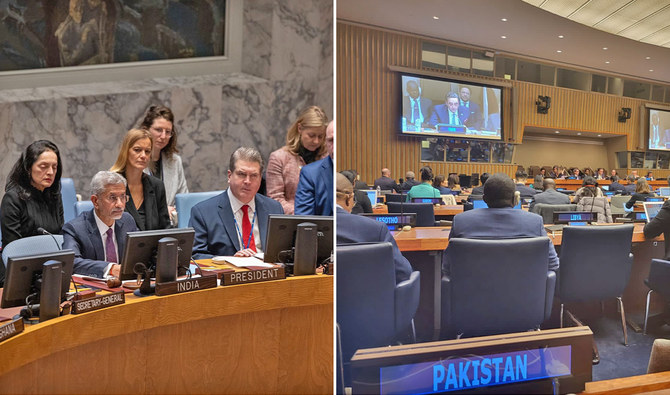UNITED NATIONS: After the UN Security Council adopted a statement Thursday warning of the increasing dangers of ‘terrorism’, envoys from India and Pakistan heatedly traded accusations blaming each other for militant attacks.
India’s external affairs minister, Subrahmanyam Jaishankar, never named Pakistan in his speech to the Security Council. But answering questions afterward from reporters, he recalled former US Secretary of State Hillary Clinton saying during a visit to Pakistan a decade ago “that if you keep snakes in your backyard, you can’t expect them to bite only your neighbors, eventually they will bite the people who keep them in the backyard.”
“Pakistan is not good at taking good advice,” Jaishankar said. “The world today sees them as the epicenter of terrorism.”
Earlier, he told the council that “India faced the horrors of cross-border terrorism long before the world took serious not of it” and has “fought terrorism resolutely, bravely and with a zero-tolerance approach.”
He said that the Sept. 11, 2001, ‘terrorist’ attack on the United States that killed nearly 3,000 people and the Nov. 26, 2008, attack that killed 166 people in Mumbai, India, must never happen again.
The 10 Mumbai attackers were members of Lashkar-e-Taiba, a Pakistan-based militant group, and Indian investigators later said their actions were directed by phone by handlers in Pakistan.
Pakistani Foreign Minister Bilawal Bhutto-Zardari was asked to respond to Jaishankar’s claim that the world sees Pakistan as “the epicenter of terrorism” at a news conference soon after.
He said that Pakistan as a nation has been the victim of ‘terrorism’ and that he as an individual is a victim of ‘terrorism’ — his mother, Benazir Bhutto, the first woman elected to lead a Muslim majority country in 1988, was assassinated by a suicide bomber who rushed her motorcade as she campaigned for president in 2007.
Bhutto-Zardari said fighting against militancy has been a cause “that is incredibly personal to me.”
“As a Muslim, as a Pakistani, as a victim of terrorism, I believe it is time that we move away from some of the Islamophobic narrative framing of this issue that took place after the awful attacks of Sept. 11, 2001, because what we witnessed from that date up until now is that terrorism, of course, knows no religion, knows no boundaries,” he said.
He said that Pakistan has lost far more lives to ‘terrorism’ than India, but that the Indians continue to say “Muslim and terrorist together,” whether in Pakistan or in India.
Bhutto-Zardari said Jaishankar should remember “that Osama bin Laden is dead, but the butcher of Gujarat lives and he is the prime minister of India.”
He was referring to Indian Prime Minister Narendra Modi, a Hindu nationalist who was accused of not doing enough to prevent the killings of nearly 1,000 Muslims during riots in 2002 in India’s western state of Gujarat, where he was the top elected official.
Before being asked about Jaishankar’s “epidemic” claim, Bhutto-Zardari told reporters that “it is about time that India and Pakistan and the international community work together ... to ensure that the financing, support, and facilitation of these (terrorist) groups come to an end.”
















